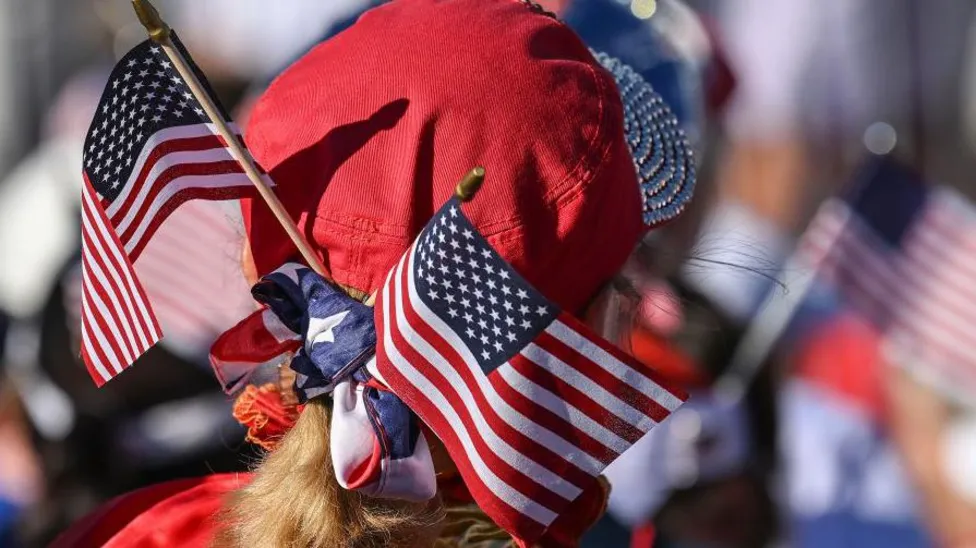Big rise in UK inflation
Real incomes 'will be lower in 2029 than today'

There are some interesting lines in the Joseph Rowntree Foundation's reaction to the rise in inflation.
The charity, which fights against poverty, called the price hikes in April "alarming" - and pointed to figures released today showing 2.9 million emergency food parcels were provided across the UK in 2024-25, up more than 50% in the past five years.
JRF economist Maudie Johnson Hunter said: "The government needs to take action to ensure their commitment to improving living standards moves from rhetoric into reality for households.
"Our research shows real incomes are currently projected to be lower in 2029 than they are today, which would be a damning legacy for a government who came to power promising to end the need for food banks."
Bad news for two of UK's biggest retailers - but it's looking positive for the pound
A pretty nasty morning for shares in two of our biggest retailers.
Shares in JD Sports Fashion have fallen by more than 8% after it warned of hits to demand and prices from US tariffs.
The company revealed a 2% fall in sales during its first quarter.
JD was the biggest faller on the FTSE 100.
Then, M&S. Its stock was 3.5% down on the back of an update to its outlook following the cyberattack it declared a month ago.
M&S said it was facing down a £300m hit to trading profits but it was looking to significantly reduce that number by the end of its financial year in March.
It warned it could be a couple of weeks yet before any kind of website sales resume and that the disruption to its operations was likely to last into July.
The FTSE 100 was 0.2% down at 8,765.
The pound was trading 0.2% up versus the dollar, at $1.34, on the back of those higher inflation figures. It briefly hit a three-year-high.
What the inflation data did was slightly hit market expectations for UK interest rate cuts this year, as we've been reporting.
Higher interest rates tend to be supportive of a domestic currency's value.
It's not all doom and gloom - we're paying less for fuel
There is one thing to feel positive about in the inflation data - the price of petrol and diesel has come down.
The average price of petrol dropped by 3p per litre in April, taking it to 134.5p, the Office for National Statistics data showed. That's down from 148.1p per litre last April.
The fall was slightly larger for diesel prices, with drivers paying an average of 3.1p less per litre last month. It cost around 141.7p, down from 157.1p in April 2024.
Oil prices dropped to a four-year low in April, due to increased supply, less demand and concerns over a global economic downturn.
Mortgage rates will 'edge upwards' within weeks, brokers warn
Mortgage rates will "edge upwards" in the next few weeks due to the higher-than-expected rise in inflation, brokers have warned.
With hopes of an interest rate cut in June almost non-existent after this morning's inflation data (see 8.10 post), borrowers have been told to "buckle up" for future mortgage rate rises.
"This increase is certainly going to stall the recent mortgage rate improvements, and with inflation due to stay above 3% for the rest of the year it may be too much to expect further base rate cuts in 2025. And that's why mortgage rates will edge upwards in the next few weeks," Justin Moy, managing director at EHF Mortgages, said in comments carried by Newspage.
Swap rates determine how much banks are charged to borrow in order to lend, and many are expecting them to rise in response to the 3.5% inflation figure.
"This will hit mortgage borrowers hard, especially those coming off fixed rates or looking to buy," said Craig Fish, director at Lodestone Mortgages and Protection.
How does the UK compare with other countries?
The UK now has one of the highest rates of inflation in the G7.
Canada, the US, France, Italy and Germany all recorded inflation rates lower than 3.5% in April.
We are still waiting for Japan's April data, which is why it's not included in the table below. Last month, it saw prices rise at a rate of 3.6%.
We've also included the inflation rate in the Eurozone - the countries that use the Euro - for comparison.
It recorded inflation at 2.2% in April.
This casts doubt on June interest rate cut, economists say - as 'most worrying' side of data highlighted
Analysts say this morning's news on inflation damages hopes of another base rate cut in June.
Paul Dales, chief UK economist at Capital Economics, said the higher-than-expected 3.5% figure for April "may suggest that the persistence of inflation is a bit stronger and/or businesses are passing on more of the recent rises in taxes".
"Either way, it casts a little doubt on expectations that interest rates will continue to be cut gradually."
Interest rates are kept high to control inflation. Higher rates squeeze people's spending power and encourage saving - these things tend to slow price rises.
After this morning's figures, financial markets continued to fully price in two further interest rate reductions this year, but the chances of the Bank of England making no changes at the next rate-setting meeting in mid-June rose slightly to 90%.
Worrying data
The "most worrying" element of the data, Dales said, was rises in core inflation (from 3.3% to 3.8%, significantly higher than expected) and services inflation (from 4.7% to 5.3%, when the Bank of England had forecast 5%).
Core inflation strips out volatile elements and services inflation is largely made up of wages - meaning the Bank of England keeps a close eye on both when setting interest rates.
One spot of hope is that Easter fell in April rather than March this year, inflating the April figure because airline prices go up during holiday periods.
"It may be reversed in May," said Dales.
In conclusion, he said: "These figures will make the Bank more alert to the possibility that this rebound in inflation will be bigger and last longer than it had been thinking."
Prices are going to rise more, business leaders say
This may not be the last of the bad news on price hikes, a leading business group has warned.
Stuart Morrison, research manager at the British Chambers of Commerce, said: "Businesses are facing a perfect storm of cost pressures, which is fuelling inflation alongside rising household bills. While April's jump was expected, the scale, to 3.5%, is concerning.
"With the national insurance hike [for employers], minimum wage rise and global tariffs, our research shows 55% of businesses are expecting to put up prices in the coming months.
"Firms urgently need to see a clear tax roadmap identifying when the burdens of national insurance and business rates will ease. Upcoming strategies on industry, trade and infrastructure must live up to business expectations and help drive investment."
What contributed to the inflation hike - and what stopped it being even higher?
Significant increases to household bills in April caused the steep rise in inflation, the Office for National Statistics has said.
The largest upward contributions came from housing and household services, transport, and recreation and culture.
Prices fell in the clothing and footwear sector as more items were on sale, helping to offset the overall inflation rate slightly.
We also saw falling prices across the furniture and household goods market, as well as in restaurants and hotels.
"Gas and electricity bills rose this month compared with sharp falls at the same time last year due to changes to the Ofgem energy price cap," ONS acting director-general Grant Fitzner said.
"Water and sewerage bills also rose strongly this year, as did vehicle excise duty, which all pushed the headline rate up to its highest level since the beginning of last year."
Chancellor 'disappointed' at higher inflation - and what her rival says
A rise in inflation had been expected due to April bill hikes and increased costs for businesses - though 3.5% is higher than the forecast 3.3%.
Chancellor Rachel Reeves has responded: "I am disappointed with these figures because I know cost of living pressures are still weighing down on working people.
"We are a long way from the double-digit inflation we saw under the previous administration, but I'm determined that we go further and faster to put more money in people's pockets.
"That's why we have increased the minimum wage for millions of working people, frozen fuel duty to protect commuters and struck three trade deals in the past two weeks that will go towards cutting bills."
Inflation was 2.2% for July last year, the month Labour took power.
Shadow chancellor Mel Stride also offered his reaction: "This morning's news that inflation is up - and now well above the 2% target - is worrying for families.
"We left Labour with inflation bang on target, but Labour's economic mismanagement is pushing up the cost of living for families - on top of the £3,500 hit to households from the chancellor's damaging jobs tax. Higher inflation could also mean interest rates stay higher for longer, hitting family finances hard.
"Families are paying the price for the Labour chancellor's choices."
Cost of living crisis 'far from over'
Union boss Sharon Graham says the surge in inflation shows that the cost of living crisis is "far from over".
"Prices have risen a third faster than wages," the leader of the Unite union says.
"Workers will only stop feeling the pinch when wages catch up. The tried and tested method for pushing up pay is collective bargaining by trade unions."
For context: For most of the cost of living crisis, inflation far outstripped wage growth, but over the past year to 18 months this trend has been reversed as inflation has fallen significantly.
In the three months to March 2025, official figures show average weekly earnings in Great Britain increased by 5.6%, excluding bonuses.
Inflation surges after 'awful April' bill hikes
Inflation surged last month to an annual rate of 3.5%, according to official figures, which blame hikes to essential household bills.
It is the highest level since January 2024 and a bigger jump than the 3.3% predicted by economists.
The Office for National Statistics said the increase, up from a 2.6% rate in March, was explained by "significant increases in household bills" in April.
Households on the energy price cap saw a rare spring rise of 6.4% in April, while council tax bills were widely up by around 5%.
The water regulator allowed suppliers to charge customers an extra £10 a month, on average, across England and Wales while broadband, mobile and TV licence costs also rose.
The consumer prices index measure of inflation is closely watched as rising numbers make it difficult for the Bank of England to cut interest rates - raised sharply by the Bank from December 2021 to tackle the infancy of the cost of living crisis.
There have been four cuts since August last year, as easing inflation has allowed.
In advance of the ONS data, financial markets had fully priced in two further interest rate reductions this year, with no change expected at the Bank's next rate-setting meeting in mid-June.
Why inflation is expected to rise this morning - and what it all means
All eyes are on the Office for National Statistics this morning, with inflation data for April due to be released at 7am.
Analysts are expecting the consumer price index to rise to 3.3%, little more than a month after it dropped by more than expected to 2.6%.
This measure, also known as CPI, is a key insight into the state of the everyday economy, tracking the cost of essentials such as food, energy and transport.
It's been on a downward trend since the turn of the year, ending January at 3%, before falling to 2.8% for February.
It's been on quite a journey over the past few years, a time that takes in the impact of the COVID pandemic and Russia's invasion of Ukraine - see this graph:
If predictions are correct, and CPI rises to around 3.3%, it would be the highest rate since February last year.
So why's it expected to go up now?
The new figures will cover April, which explains why most observers are braced for a rise.
Let's break that down.
Energy, water and council tax bills rose throughout the UK at the start of this month.
New national insurance contributions kicked in, as did the increased national living wage, with these added costs for employers potentially passed down to the consumer.
Julien Lafargue, chief market strategist at Barclays Private Bank, agreed headline inflation would likely jump above 3%.
"This is driven by a number of one-off adjustments, including the new national insurance contributions and the increased national living wage," he said.
"There is also the impact of Easter, which fell squarely in April in 2025 but was in March in 2024, as well as the lovely weather that the UK has experienced in recent weeks."
What does this mean?
The Bank of England's target is to keep inflation at 2%.
But it's felt that hovering around the 3.3% mark will keep it within an acceptable range.
"All this will make for a relatively noisy report at a time when the Bank of England is eagerly trying to figure what to do next," Lafargue added.
"However, beyond the short-term distortions, we believe the overall direction of travel for UK inflation is lower.
"This should provide the central bank with room to consider at least a couple more interest rate cuts this year, supporting favourable economic conditions going forward."
Fat cat landlords notion is 'fiction', survey suggests
The average landlord earns less than £20,000 in rental income, while half (52%) earn less than £10,000, research has found.
An Ipsos study commissioned by HMRC found 93% of landlords own property individually, while just 7% own through a company.
More than half of landlords (55%) own one property.
And while the majority of landlords (60%) purchased or bought their property as an investment, a substantial proportion (40%) originally purchased the property to live in, or received it through inheritance or as a gift.
Patricia McGirr, founder at Repossession Rescue Network, told Newspage: "The idea of the fat cat landlord is a fiction. Governments like to peddle this myth to justify increasing legislation and taxation.
"The reality is, most earn less from rent than a part-time barista. This is not passive income. It’s patchy, precarious and under pressure."
She said the rental market is "on a slow bleed to collapse and Whitehall has just removed the life support", with one in three considering selling up.
Data found 24% plan to sell within a year, with 33% aiming to sell within five years.
If this happens, she warned, rents will rise as supply sinks.
-SKY NEWS







